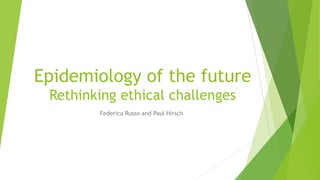
Epidemiology for the Future – Rethinking Ethical Challenges
- 1. Epidemiology of the future Rethinking ethical challenges Federica Russo and Paul Hirsch
- 2. Knowledge and Action Epidemiology and Public Health We set aside questions about ethical challenges in study design of epidemiology Here, we consider epidemiology as the main knowledge base of public health interventions We focus on ethical aspects involved in public health interventions Main idea: no direct, simple, obvious relation between ‘what we know’ and ‘what to do’ For epistemological reasons For normative reasons 2
- 3. Epistemology of public health interventions ExpDisease Therefore ~Exp~ Disease This simple causal relation works in very limited contexts but fails in the vast majority of public health contexts Instead, we need to identify complex bio-social mechanisms to intervene upon Often, interventions will have to target remote, distant factors rather than proximate ones Settling an epistemology for PH intervention is hard enough on its own, and further complicated by normative considerations 3 M. P. Kelly and F. Russo, ‘Causal narratives in public health, Sociology of Health & Illness, Oct. 2017, doi: 10.1111/1467-9566.12621.
- 4. Public health ethics Ethical problems always require simplification, but it’s important to be aware how the simplification process functions to leave out/ obscure important problem dimensions The formulation of public health problems and associated analytical approaches in terms of ethical dilemmas is an example of (problematic) simplification: • Simplify a problem • Nail down two options • Force agent to choose between them “Vaccination poses a dilemma between freedom and public health,” or “Sharing health data poses a dilemma between privacy and knowledge" These are common simplifications that obscure important problem dimensions 4
- 5. Navigating complex ‘trade-offs’ Public health interventions are the outcome of description and evaluation of complex scenarios, in which actors and stakeholders negotiate on a number of trade-offs 1. Values and Valuation - what counts as a gain or loss? 2. Scientific evidence and concepts - what grounds decisions? 3. Process and Governance - who participates, how are decisions made? 4. Power and Inequalities - who has the power to simplify, how is it exercised? We ponder and deliberate numerous + and -, within each lens, and across all these lenses 5 P. D. Hirsh and P. J. Brosius, ‘Navigating Complex Trade-Offs in Conservation and Development: An Integrative Framework’, Issues in Interdisciplinary Studies, vol. 31, pp. 99–122, 2013.
- 6. Navigation in practice: Covid and wearing face masks The problem of face masks We need to reduce exposure to the virus — how to do that? All well-taken measures of hygiene and social distancing Wear a mask: to protect yourself, to protect others Where to wear a mask? When to wear a mask? What kind of mask? Who should/can wear a mask? 6
- 7. Covid and face masks: false dilemmas Numerous countries made face masks compulsory (e.g. Germany, Italy, France). Others long hesitated or just advised to wear them (e.g. Netherland, UK, US). To wear or not to wear? To mandate or not to mandate? Problematic oversimplifications: o Face masks should be obligatory only if full evidence is available or if full protection is ensured. Otherwise don’t. o Face mask mandates pose a dilemma between individual sovereignty and public health. 7
- 8. Evaluating complex trade-offs through 4 lenses What counts as gain or loss? What publicly held values are affected by government mask mandates (e.g. public health, basic human rights), and what are the acceptable thresholds at which those values can be considered to be upheld? What grounds decisions? What is the evidence that a mask will be an effective means to reduce exposure? If evidence is limited regarding the impacts of mask use, can we legitimately infer not to mandate their use? What is the evidence that will promote identified values, and to what degree? Who participates and how are decisions made? How are people included in decisions when the different values at stake are in conflict or tension? Should a government suggest or impose wearing masks, and under what circumstances? Who has the power to simplify, and how is that power exercised? Do dominant problem frames exclude certain voices from public conversations and decision processes about mask mandates? How can the issues be reframed to include the range of relevant perspectives? None of the answers to this questions leads to binary dilemmas They all point to a decision - an outcome - of a complex pondering of various trade-offs 8
- 9. Questions of scientific evidence • We know how certain types of professional masks protect healthcare workers • But if ‘gold’ masks are missing, what should people do? What’s the evidence? • Problem: the ‘gold’ evidence we would generate in ‘normal’ circumstances is not available • We can’t rely now on trials, but must draw conclusions from various observational studies or other • How to draw conclusions from non-gold evidence? • Ponder what each study contributes, even if it is not ‘gold’, whether the cumulative evidence gathered favours wearing masks • Yes, an argument for evidential pluralism • Trade off the gathered evidence with the suggested measure. What would be the loss of wearing a mask, in case it is not effective enough? • Yes, an argument from precaution 9
- 10. Concluding remarks Ethicists are often tasked with issuing verdicts on what is right or wrong We want to develop a framework to empower people to navigate complex situations in which multiple dimensions are at work, informed by ethical, epistemological, procedural, and critical dimensions. A methodological approach to decision making in which ethical aspects are built into the process, not external, ‘after-the-fact’ evaluations An approach to science communication that appreciate the real difficulty in reaching decisions, pondering all trade-offs Our main message: Ethics and epistemology are deeply intertwined, any attempt to address them separately is bound to remain partial 10
